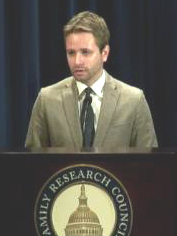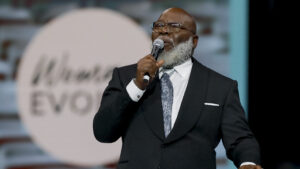
WASHINGTON (BP) — Young people are propelling a “new Christian conservatism,” Owen Strachan asserted in a lecture at the Family Research Council in Washington.
Strachan, of Boyce College, the undergraduate school of Southern Baptist Theological Seminary, lectured on “The Sacrificial Witness of the Christian Moral Tradition” in the most recent Family Policy Lecture. Past speakers in the lecture series include Os Guinness and Eric Metaxas.
“The spirit of Wilberforce is on the move,” said Strachan, assistant professor of theology and church history at the Louisville, Ky., campus. “This movement sees that love in its essence is not shorn of conviction, love is instead a summons to a joyful transformation. Now is the moment for a new Christian conservatism, or what we could call a new social witness.”
The new Christian conservatism “grounds its identity in the preaching of the Gospel,” Strachan said, “yet it cannot help but act on behalf of others.”
Strachan, in his Oct. 24 lecture, pointed to the life and witness of German pastor Dietrich Bonhoeffer, who was martyred in 1945 for his stand against the Nazi regime. Prior to his death, Bonhoeffer mourned the “moral equivocation” of his time and the silence of many Christians in the face of evil acts committed against helpless people.
In present-day America, the situation is comparable, Strachan said, noting, “Our conflict is not militaristic — we are a nation divided by ideas, driven by beliefs.”
America has shifted from Protestant ideals, with many Christians choosing to balk when handed hard issues, Strachan said. Instead, they bemoan how they are “tired of culture wars, for being known what we are against, not what we are for.”
In response to the trend of Christians reshaping their beliefs toward cultural demands, Strachan asked, “How should we frame our public testimony?”
Citing examples throughout church history, Strachan noted the examples of the apostolic fathers and martyrs in the first few centuries of the Christian church.
“In the midst of this world of opposition, Christians testified to the ethics created by the Gospel in the public square,” Strachan said as he shared the stories of Blandina, a female slave tortured to death in the second century, and Justin Martyr, who sought the transformation of lives and culture.
The early Christian writing known as the Didache also condemns the culture’s approval of abortion and pedophilia, Strachan said.
“The vital morality of the Christians stood out for what it represented: a call to salvation, a summons to a better world,” he said of the Christian witness in the early church.
Compelled by the example of the early church martyrs, Augustine developed the theory of the wise judge in his “City of God,” who brings “the ethics of the city of God into the city of man.”
Strachan also observed the commitment of Puritan pastor Samuel Sewall and British abolitionist William Wilberforce, who fought against slavery to “help the marginalized, the voiceless.”
“The Christian moral framework has changed the world over and over again,” Strachan said.
Puritans like Jonathan Edwards and Samual Hopkins also helped build the “benevolent empire,” which provided hospitals, opened orphanages and funded missions programs through its theological convictions.
In the 20th century, Strachan said men like Bonhoeffer and Martin Luther King Jr. “electrified the conscience through their distinctive calls to an ethical way of life” and “paid the ultimate price for their Protestant convictions.”
“We are the true culture; we are those who must speak up and create this culture in the fallen world,” Strachan said. Describing what he called the “new Christian conservatism,” he asserted that the movement, contrary to popular belief, is vibrant and youthful.
“It is a movement born not of cynicism but of hope,” Strachan said, noting the reaction against the softer Christianity which decries any conviction that leads to cultural opposition.
This movement is “built upon the framework of the Moral Majority,” Strachan said, but claimed in contrast that the new way offers “a gracious voice” and a “focus on human flourishing.”
Strachan acknowledged “that ultimate victory may only come when the curse is overturned,” but urged Christians to pursue this better way of “sacrificial witness.”
“Our call is not to capitulate; our call is to witness and, indeed, to sacrifice,” Strachan said.
Strachan’s full lecture is available online in both video and audio formats at the Family Research Council’s website, https://www.frc.org/eventregistration/the-sacrificial-witness-of-the-christian-moral-tradition.
–30–
Craig Sanders is a writer for Southern Baptist Theological Seminary.















